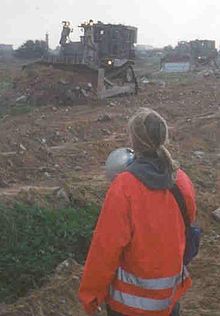Tag: BDS
-
ISM’s response to the Rachel Corrie verdict
The International Solidarity Movement (ISM) is deeply concerned by the verdict of Judge Oded Gershon that absolved Israel’s military and state of the 2003 murder of American ISM activist Rachel Corrie. Rachel was crushed to death by an Israeli army bulldozer while protesting the demolition of a Palestinian home in the Gaza Strip. Despite the…
-
Gaza activists: #RememberRachel and support #BDS
Palestinians in Gaza support the Corrie family on the eve of the verdict in their lawsuit against Israel over its 2003 killing of their daughter Rachel, as well as divestment from Caterpillar and the global Boycott, Divestment, and Sanctions (BDS) movement.
-
An Open Letter from Gaza to EU: Do not reward apartheid!
19 August 2012 | Besieged Gaza, occupied Palestine We call on the European Union to challenge and not embrace Israel’s incessant land expropriation and racist subjugation against the Palestinian people. The European Union’s own reports document and supposedly lament Israel’s apartheid policies, yet continues to pursue policies that legitimize them, such as the scandalous upgrade…

